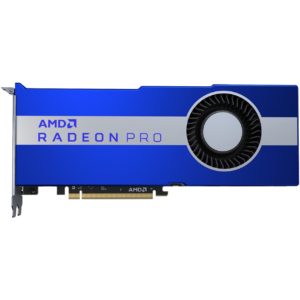 Today announced the AMD Radeon Pro VII workstation graphics card for broadcast and engineering professionals, delivering exceptional graphics and computational performance, as well as innovative features. The new graphics card is designed to power today’s most demanding broadcast and media projects, complex computer aided engineering (CAE) simulations and the development of HPC applications that enable scientific discovery on AMD-powered supercomputers.
Today announced the AMD Radeon Pro VII workstation graphics card for broadcast and engineering professionals, delivering exceptional graphics and computational performance, as well as innovative features. The new graphics card is designed to power today’s most demanding broadcast and media projects, complex computer aided engineering (CAE) simulations and the development of HPC applications that enable scientific discovery on AMD-powered supercomputers.
Today’s professionals are challenged to meet high pressure deadlines under increasingly tight budgets while aiming to deliver world-class results,” said Scott Herkelman, corporate vice president and general manager, Graphics Business Unit at AMD. “They demand more from their graphics card, and AMD Radeon Pro VII delivers. It provides innovative, high-performance technologies that allow users to easily manage larger, more complex simulations, create and manage exceptionally high-resolution digital media and digital signage content, and develop advanced HPC applications to drive new waves of scientific discovery on large scale supercomputer deployments.”
The AMD Radeon Pro VII graphics card offers 16GB of extreme speed HBM2 (High Bandwidth Memory), and support for 6x synchronized displays and high-bandwidth PCIe 4.0 interconnect technology. Providing up to 26 percent higher 8K image processing performance in Blackmagic Design DaVinci Resolve1 and up to 5.6x the double precision (FP64) performance-per-dollar versus the competition2, the new graphics card introduces AMD Infinity Fabric Link technology3 to the workstation market. AMD Infinity Fabric Link speeds application data throughput by enabling high-speed GPU-to-GPU communications in multi-GPU system configurations.
The new workstation graphics card provides the high-performance and advanced features enabling post-production teams and broadcasters to visualize, review and interact with 8K content whether in the broadcast booth, on the studio floor or in the media server pipeline. It also enables engineers and data scientists to handle larger and more complex models and datasets, while reducing run times for engineering simulations and scientific computing workloads.
Key capabilities and features of the AMD Radeon Pro VII graphics card include:
- Leading Double Precision Performance – With up to 6.5 TFLOPS (FP64) of double precision performance for demanding engineering and scientific workloads, the Radeon Pro VII graphics card provides 5.6x the performance-per-dollar1 versus the competition on the AMD Internal Benchmark for
- Altair EDEM “Screw Auger” viewset.
- High-speed Memory – 16GB of HBM2 with 1TB/s memory bandwidth and full ECC capability handles large and complex models and datasets smoothly with low latency.
- AMD Infinity Fabric Link – A high-bandwidth, low-latency connection that allows memory sharing between two AMD Radeon Pro VII GPUs, enabling users to increase project workload size and scale, develop more complex designs and run larger simulations to drive scientific discovery. AMD
- Infinity Fabric Link delivers up to 5.25x PCIe 3.0 x16 bandwidth with a communication speed of up to 168 GB/s peer-to-peer between GPUs.
- Remote Working – Users can access their physical workstation from virtually anywhere for unhindered productivity with the remote workstation IP built into AMD Radeon Pro Software for Enterprise driver4.
- High-bandwidth PCIe 4.0 Support – PCIe 4.0 delivers double the bandwidth of PCIe 3.0 to enable smooth performance for 8K, multichannel image interaction.
- Frame Lock/Genlock – Enables precise synchronized output for display walls, digital signage and other visual displays (AMD FirePro™ S400 synchronization module required).
- High-resolution/Multi-display Support – Supports up to 6x synchronized display panels, full HDR and 8K screen resolution (single display) combined with ultra-fast encode and decode support for enhanced multi-stream workflows.
- Professional Application Certification – Optimized and certified with leading professional applications for stability and reliability. The list of Radeon Pro Software-certified ISV applications can be found here.
- ROCm Open Ecosystem – Open software platform for accelerated compute provides an easy GPU programming model with support for OpenMP, HIP, and OpenCL™, as well as support for leading machine learning and HPC frameworks, including TensorFlow™, PyTorch™, Kokkos, and RAJA.
AMD Radeon Pro Software for Enterprise 20.Q2
AMD Radeon Pro workstation graphics cards are supported by the Radeon Pro Software for Enterprise driver, delivering enterprise-grade stability, performance, security, image quality and other innovative features, including high-resolution screen capture, recording and video streaming. The latest release offers up to a 14 percent year-over-year performance improvement for current-generation AMD Radeon Pro graphics cards5. The new software driver is now available for download from AMD.com
Updated AMD Rendering Software
AMD also released updates for AMD Radeon ProRender, a physically-based rendering engine built on industry-standards that enables accelerated rendering on any GPU, any CPU and any OS6. The updates include new plug-ins for SideFX Houdini and Unreal Engine, and updated plug-ins for Autodesk Maya and Blender. For developers, an updated AMD Radeon™ ProRender SDK is now available on the redesigned GPUOopen.com site, and is now easier to implement with an Apache License 2.0. AMD also released a beta SDK of the next-generation Radeon ProRender 2.0 rendering engine with enhanced CPU and GPU rendering support with open-source versions of the plug-ins.
Availability
The AMD Radeon Pro VII graphics card is expected to be available from major etailers/retailers beginning mid-June for an SEP of $1899 USD. AMD Radeon Pro VII-equipped workstations are expected to be available in the second half of 2020 from leading OEM partners.




